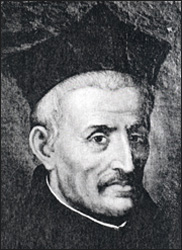General from 1687 to 1705
After the death of de Noyelle the 13th General Congregation was called for June 22 until Sept. 7, 1867. The Pope had made it clear that he wanted the Congregation to elect Gonzalez General and to approve a decree expressly stating that Jesuits were free to defend probabiliorism with a clear conscience. The Congregation voted in that wise. The 65 year old Gonzalez was elected General as Innocent had requested on July 6, 1687. Nine years later another, the 14th, General Congregation was called by Gonzalez at the request of the Pope. This was done in accord with the decree of Innocent X, which required the Jesuits to have a General Congregation every nine years. So, the 14th Congregation convened in 1696. Everything went well and it ended in peace. In 1702 he sent a memorial to Clement XI complaining that the doctrine of probabilism meant the end of the Society. Gonzalez
was 80 years old by this time and was failing physically. His Assistants
advised him to choose a Vicar General and he chose Michelangelo Tamburini
to help him. The next "9 year" General Congregation was coming
closer and was called for January 1706. The General insisted on imposing
his own moral ideas on the whole Society and the Theologians balked. As
the delegates began arriving in Rome for the 15th General Congregation,
Thyrsus Gonzalez was called to eternal reward and a great sigh of relief
was heard among the delegates and in Jesuit houses around the world. God
had solved a vexing internal problem. After a Generalate of 18 years and
3 months Gonzalez died on October 27, 1705 and was laid to rest with the
remains of the previous Fathers General in the crypt of the Gesú.
|
